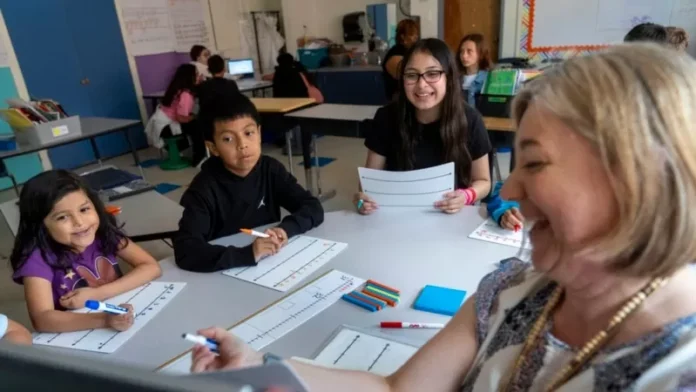Alexandria, Virginia – At Mount Vernon Community School, students are being given the opportunity to catch up on their learning after the setbacks caused by the COVID-19 pandemic. With the help of dedicated educators and innovative strategies, students are making progress towards getting back on track.
The past four years have been challenging for schools across America, with the pandemic causing disruptions in learning and widening the achievement gap. While there has been some improvement in academic performance, it has been slow and uneven, with marginalized students often bearing the brunt of the setbacks.
According to the Education Recovery Scorecard, a study conducted by researchers at Harvard and Stanford, students have made up one-third of their pandemic losses in math and one-quarter in reading. However, in nine states, including Virginia, reading scores have continued to decline even after previous decreases during the pandemic.
One of the major challenges facing the recovery efforts is the looming financial crisis. While some states have used the historic $190 billion in federal pandemic relief to help students catch up, this funding will soon run out. This has prompted calls for state action and planning to ensure that progress is not reversed once the federal money expires.
In Virginia, lawmakers have taken steps to accelerate the recovery process by approving an extra $418 million last year. Massachusetts has also allocated funds for math and literacy tutoring programs. However, in other states where progress has been lagging, there has been little change in strategies or increased spending to speed up improvement.
Virginia has taken a proactive approach by hiring online tutoring companies and providing schools with a “playbook” on how to build effective tutoring programs. Lisa Coons, Virginia’s superintendent of public instruction, acknowledges that last year’s state test scores were a wake-up call and more needs to be done to help students catch up.
U.S. Education Secretary Miguel Cardona has also emphasized the importance of continued funding for academic support as the federal money expires. He stresses that interventions have been proven to work and funding for public education makes a real difference.
At Mount Vernon, a bilingual school where classes are taught in English and Spanish, students are divided into groups and rotate through customized stations based on their skill level. Those who need the most help receive online tutoring from companies like Ignite Learning, which has been a valuable resource in meeting the high demand for tutors.
Principal Jennifer Hamilton notes that the online option has been a big help, as it is something the school would not have been able to provide on its own. One parent, Ana Marisela Ventura Moreno, praises the extra reading help her 9-year-old daughter received last year during second grade, but acknowledges that she is still catching up and needs more support.
The Alexandria district, where Mount Vernon is located, has had to prioritize students with the greatest needs due to limited resources. While the district is slowly improving, officials are concerned about the widening achievement gaps, especially among poorer students. Failing to get students back on track could have long-lasting consequences, as demonstrated by the Harvard and Stanford researchers who found a correlation between higher test scores and higher incomes and lower rates of arrest and incarceration.
The Education Recovery Scorecard tracks about 30 states, all of which have shown some improvement in math from 2022 to 2023. However, only a few states have rebounded to pre-pandemic testing levels. Alabama was the only state where math achievement increased past 2019 levels, while Illinois, Mississippi, and Louisiana accomplished that in reading.
In Chicago Public Schools, there has been a significant improvement in reading scores, with an equivalent of 70% of a grade level increase from 2022 to 2023. The district credits this progress to changes made possible by nearly $3 billion in federal relief. The district has trained hundreds of tutors and provided every school building with an interventionist to help struggling students. They have also focused on engaging students through home visits and expanded arts education.
Bogdana Chkoumbova, the district’s chief education officer, stresses the importance of not just focusing on academic recovery, but also on engaging students. This sentiment is echoed by Vincent Izuegbu, principal of Wells Preparatory Elementary, where just 3% of students met state reading standards in 2021. With the help of an interventionist and teachers working collaboratively, the school has seen a significant improvement in reading scores.
One student who has benefited from the extra support is Olorunkemi Atoyebi. After falling behind

